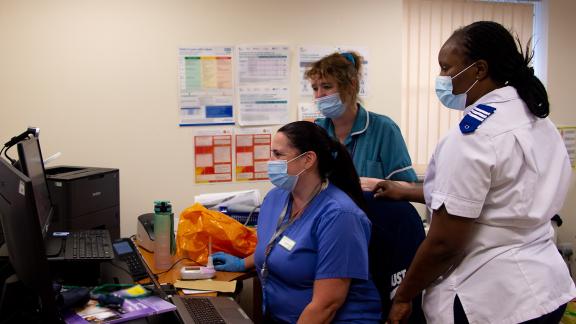Understanding and reducing tensions between staff in relation to agile working
Key points
Increasing the level of flexibility offered to employees at work has become a key priority for NHS organisations.
NHS organisations have reported signs of rising tensions between clinical and non-clinical workers with respect to their different agile working opportunities.
The NHS is increasingly competing in a diverse labour market where employees can explore careers with other sectors offering a variety of flexible benefits, agile working patterns and opportunities.
NHS Employers commissioned Dr Emma Russell (University of Sussex) and her team at agiLab to undertake research to understand what people feel about the agile working arrangements of other groups, and how this affects their thoughts, feelings and behaviours. This can help to identify and understand whether, why and how clinical and non-clinical workers are experiencing conflict with each other. We can then begin to outline action plans for dealing with and resolving such conflict.

AgiLab is the co-creation of academics at the University of Sussex, NHS Employers National Engagement Services (NES), senior workforce leaders and trade union representatives. AgiLab aims to promote and facilitate an evidence-based approach to best practice and research in agile working through academic and practitioner collaboration and knowledge exchange.
This research programme was independently carried out by Dr Emma Russell and Dr Smadar Cohen-Chen, with the research team at the University of Sussex to understand what causes tension between clinical and non-clinical staff, and what can be done to strengthen relationships. It was commissioned and supported by NHS Employers who co-designed the study, helped to recruit participants and engaged with the research team to consider the findings.
What we did
Dr Emma Russell and the team used a framework of emotional expressions, and an experimental approach with nearly 300 workers, to examine how expressed emotions about agile working arrangements might evoke different reactions from workers representing different groups.
Participants were given three scenarios and after reading them they were asked to comment on how this presentation made them feel, think and act in relation to the worker and the group that the worker represented.
Clinical scenarios
Read the scenarios that were presented to the group.
Non-clinical scenarios
Read the scenarios that were presented to the group.
What the research found
The research found that both clinical and non-clinical workers felt the most empathy towards clinical workers, in respect of their agile working arrangements, indicating that both groups see the deal offered to clinical workers as less beneficial.
Indifference
Russell and colleagues explain: 'Indifference’ is a dysfunctional emotional reaction that can be a late-stage indicator of burnout, and a sign that workers are struggling or shutting down. It is expressed as non-emotional, or anti-emotional responses to events.
When staff read about a colleague expressing indifference about their agile working arrangements, empathy and compassion was lower. However, when staff members showed negative emotions or a non-emotional expression about their agile working arrangements, other colleagues were more empathetic towards them because they could see that their colleague was burdened, having a hard time, frustrated and upset.
This set of findings indicates that when people express indifference about their agile working arrangement (I don’t care, it doesn’t matter to me), others will feel less empathy towards them.
Staff were also less likely to want to help or support indifferent colleagues, be that clinical or non-clinical staff, even when they were having a hard time.
Recommendations - what employers can do
Russell and colleagues say that many people choose to work in the NHS to help and care for people and make a difference. When faced with colleagues who do not seem to share that sense of vocation, they may feel let down.
While the natural reaction towards a worker expressing signs of indifference might be to feel impatient and annoyed, these are the workers whose agile working arrangements are less likely to be working for them and are at highest risk of burnout.
Those expressing indifference need support
The report suggests that NHS staff should be supported to understand and recognise that the expression of indifference could be signs of struggle, and signify a need for support. They most likely need a change of pattern and to discuss with their line manager how they could adjust their agile working arrangements.
The report makes several recommendations for the NHS to adopt to help address the reported conflict emerging between clinical and non-clinical workers:
Communication
Encourage staff to share their emotions about their agile work. This could help inform a need for change to ensure working patterns are truly agile and meeting workers’ needs.
These conversations can be incorporated in to health and wellbeing conversations as recommended by NHS People Plan, where managers put in place strategies to support colleagues who are struggling, and discuss what improvements can be made to ensure working arrangements are truly agile and meeting their evolving needs.
Encourage team-level discussions about agile working arrangements. Staff should feel comfortable discussing beneficial and effective options that can be rolled out as well as problematic patterns of work that can be changed.
Awareness
Signs of indifference should be highlighted to staff so that early identification allows enough time to support coping mechanisms. These include raising awareness of indifference as a red flag, teaching staff to recognise when they are experiencing hostile reactions.
Resilience culture
NHS workers have built up resilience to enable them to cope with difficult periods at work, however resilience culture could potentially result in the suppression of emotions. This could promote feelings of indifference and disengagement.
Steps to reduce the negative effect of resilience culture include using resilience training given to staff that focuses on emotional expression. Managers should be educated on the negative consequences of overtly resilient cultures.



